#guernica magazine
Text
JTA and Andrew Lapin
Almost as soon as the piece appeared online, it began drawing criticism from within the Guernica staff. Founded in 2004 partly in response to the Iraq War and named after Pablo Picasso's famous anti-war painting, the nonprofit magazine has long married literary bona fides and left-wing politics.
Joshua Gutterman Tranen, an anti-Zionist Jewish writer who has published in Guernica in the past, specifically pointed out a passage he found objectionable in which Chen briefly pauses her volunteer work after October 7, writing, "How could I continue after Hamas had massacred and kidnapped so many civilians, including Road to Recovery members, such as Vivian Silver, a longtime Canadian peace activist? And I have to admit, I was afraid for my own life."
"The moment in the Guernica essay where the Israeli writer – who never considers why Palestinian children don't have access to adequate healthcare b/c of colonization and apartheid – says she has to stop assisting them getting medical support because of 'Hamas,'" Tranen tweeted. "This is genocidal."
Chen's essay is not the first time progressive Jews and Israelis have been condemned for being insufficiently critical of Israel. The official movement to boycott Israel, for example, called for a boycott of Standing Together, an Israeli-Palestinian coexistence group that opposes the war, saying that the group promotes "normalization" of Israel. And when Haymarket Books, a left-wing publisher, recently announced a book co-authored by longtime leaders of the anti-Zionist group Jewish Voice for Peace, it drew sharp criticism on Instagram – in part because one author, who supports boycotting Israel, is married to an Israeli and has family members in Israel.
For some Jews who have questioned their place in progressive and literary spaces since October 7, Guernica's retraction offered new evidence of a toxic discourse in which no Israeli or Jew can pass muster.
"THIS is what was beyond the pale? This essay of nuance, lived experiences, fears, hopes, and continuing to strive in her own way for peace?" tweeted Sara Yael Hirschhorn, a historian of modern Israel who has written about her own struggle to sustain her liberal Zionist outlook after the attack, after reading the retracted piece. "Obviously this is just a bigoted decision about an Israeli and Jewish author … This virtual burning of books is bareknuckled antisemitism."
Emily Fox Kaplan, a Jewish writer who had shared the essay before it was retracted, wrote that she saw the criticism of Chen's essay as part of a much wider dynamic.
"The problem, when it really comes down to it, is that it presents an Israeli as human," she tweeted. "The people who are losing their minds about this want to believe that there are no civilians in Israel. They want a simple good guys/bad guys binary, and this creates cognitive dissonance."
Some non-Jewish writers also lamented the piece's retraction.
Matt Gallagher, a war correspondent who is also a veteran and who opposes the Israel-Hamas war, said his own work had benefited from reading thoughtful authors whose perspectives were different from his own.
"If you want the war in Gaza to end, as I do," he tweeted, "shouting down calm Israeli voices mulling the ruin of it all isn't going to help."
#guernica#guernica magazine#progressive jews#joanna chen#israel#hamas#gaza#jews#jewish writers#boycott#antisemitism#israelis as human
42 notes
·
View notes
Text
A powerful piece by Phil Klay on Guernica's cowardly decision to pull an essay by an Israeli author (without the courtesy of informing her first) because of objections from the magazine's staff and writers.
Klay argues that pulling the piece is a "betrayal of the task of literature, which cannot end wars but can help u see why people wage them, oppose them, or become complicit in them.
"Empathy here does not justify or condemn. Empathy is just a tool. The writer needs it to accurately depict their subject; the peacemaker needs it to be able to trace the possibilities for negotiation; even the soldier needs it to understand his adversary. Before we act, we must see war’s human terrain in all its complexity, no matter how disorienting and painful that might be. Which means seeing Israelis as well as Palestinians—and not simply the mother comforting her children as the bombs fall and the essayist reaching out across the divide, but far harsher and more unsettling perspectives."
2 notes
·
View notes
Text
After The Offering Ritual, Cain Carries Abel Home
By I.S. Jones
Violence is a failure of communication.
The shoulder severed from the dream
of the socket. Most pain is useless
but it’s the body’s oldest song.
I want my own suffering to be intimate.
I do what I can to ease Abel’s wailing.
The goat’s final gesture to dethrone
her from the stone altar, to stir its might
against its master. The beast saw the light
but not the blade. Abel saw the resistance
but not the panic. I had never seen so much blood
moan from an animal’s throat. To unburden
the beast of its crimson gown, which dresses
now my sister’s sutana. Heaven’s blue flame
laps the goat up. Despite our best labor,
eventually Baba comes to collect. It’s either the animals
or us; the best of the harvest or the soil
will consume our true names. We have blood and dirt,
together they make God. And what does mercy look like
between humans? A sister reaching to lift a sister
from the ground. When I say a love that will end us,
I mean “mercy.” Remember, I offered you my hand once.
Push me away, if you like.
2 notes
·
View notes
Text
#josh kline#project for a new american century#guernica magazine#dystopian art#dystopian america#art elitism#human capital
1 note
·
View note
Text
#this made me reminisce on my first cool adults#music writing#jazz#guernica magazine#currently reading
0 notes
Photo
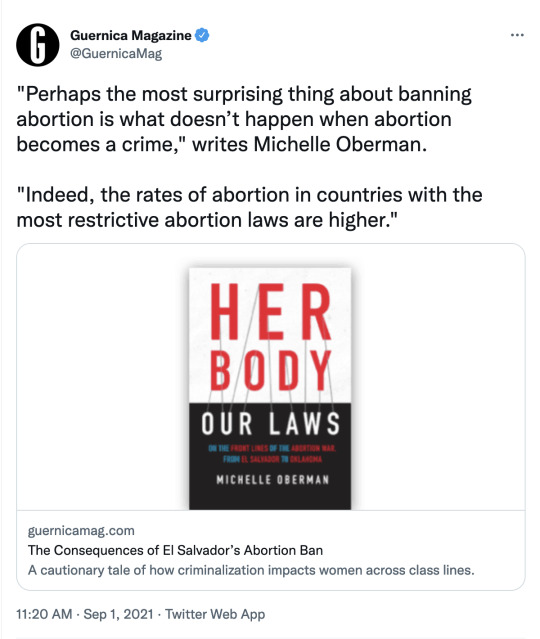
https://twitter.com/GuernicaMag/status/1433102594726146059
1 note
·
View note
Text
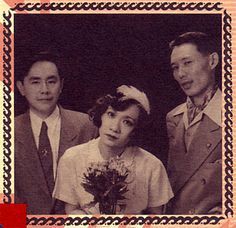

Guernica
#jun togawa#togawa jun#guernica#yapoos#suki suki daisuki#戸川純#ヤプーズ#好き好き大好き#magazine#poster#japan#japanese#japan girl#japanese girl#japan idol#japanese idol#japan music#japanese music#japan fashion#japanese fashion#girl#idol
46 notes
·
View notes
Text
Submission Spotlight: Guernica
If you're looking for a lit mag to place short fiction with a slant towards originality (or even weirdness) and a lot of interiority, may I suggest Guernica? They're open now, and there's no fee. Competition is a tough, so send your best! #publishing
As of May 2023, Guernica is currently open for no-fee submissions here (follow their link to create a free Submittable account). Founded in 2004, Guernica publishes poetry, essays, fiction, criticism, and journalism online. Unlike most magazines, it pays contributors rather than staff; in fact, its staff are entirely volunteers. Rather than a university affiliation, the magazine is partnered with…

View On WordPress
#Guernica#literary editors#literary journals#literary magazines#literary marketplace#no submission fee journal#paying markets for short stories#publishing fiction#publishing short stories#Rachel Khong#Sarmista Das#submissions#Submittable for writers#submitting fiction#The Los Angeles Review of Books#Yorgos Lanthimos
0 notes
Text
poetry outlets that support a free palestine
after finding out that the poetry foundation/POETRY magazine pulled a piece that discussed anti-zionism because they "don't want to pick a side" during the current genocide, i decided to put together a list of online outlets who are explicitly in solidarity with palestine where you can read (english-language) poetry, including, except where otherwise stated, by palestinian poets!
my criteria for this is not simply that they have published palestinian poets or pro-palestine statements in the past; i only chose outlets that, since october 7, 2023, have done one of the following:
published a solidarity statement against israeli occupation & genocide
signed onto the open letter for writers against the war on gaza and/or the open letter boycotting the poetry foundation
published content that is explicitly pro-palestine or anti-zionist, including poetry that explicitly deals with israeli occupation & genocide
shared posts that are pro-palestine on their social media accounts
fyi this is undoubtedly a very small sample. also some of these sites primarily feature nonfiction or short stories, but they do all publish poetry.
outlets that focus entirely on palestinian or SWANA (southwest asia and north africa) literature
we are not numbers, a palestinian youth-led project to write about palestinian lives
arab lit, a magazine for arabic literature in translation that is run by a crowd-funded collective
sumuo, an arab magazine, platform, and community (they appear to have a forthcoming palestine special print issue edited by leena aboutaleb and zaina alsous)
mizna, a platform for contemporary SWANA (southwest asian & north africa) lit, film, and art
the markaz review, a literary arts publication and cultural institution that curates content and programs on the greater middle east and communities in diaspora
online magazines who have published special issues of all palestinian writers (and all of them publish palestinian poets in their regular issues too)
fiyah literary magazine in december 2021, edited by nadia shammas and summer farah (if you have $6 usd to spare, proceeds from the e-book go to medical aid for palestinians)
strange horizons in march 2021, edited by rasha abdulhadi
the baffler in june 2021, curated by poet/translators fady joudah & lena khalaf tuffaha
the markaz review has two palestine-specific issues, on gaza and on palestinians in israel, currently free to download
literary hub featured palestinian poets in 2018 for the anniversary of the 1948 nakba
adi magazine, who have shifted their current (october 2023) issue to be all palestinian writers
outlets that generally seem to be pro-palestine/publish pro-palestine pieces and palestinian poetry
protean magazine (here's their solidarity statement)
poetry online (offering no-fee submissions to palestinian writers)
sundog lit (offering no-fee submissions to palestinian writers through december 1, 2023)
guernica magazine (here's a twitter thread of palestinian poetry they've published) guernica ended up publishing a zionist piece so fuck them too
split this rock (here's their solidarity statement)
the margins by the asian-american writers' workshop
the offing magazine
rusted radishes
voicemail poems
jewish currents
the drift magazine
asymptote
the poetry project
ctrl + v journal
the funambulist magazine
n+1 magazine (signed onto the open letter and they have many pro-palestine articles, but i'm not sure if they have published palestinian poets specifically)
hammer & hope (signed onto the letter but they are a new magazine only on their second issue and don't appear to have published any palestinian poets yet)
if you know others, please add them on!
4K notes
·
View notes
Note
where do you find articles or personal essays to read? and also do you have any favorite sources for news? i want to read more but i’m having a difficult time finding sources 🤍
I've answered this just recently but here's a more complete list for essays from places I visit most often (favourites are marked **)
LitHub**
Electric Literature**
Guernica Magazine**
Hazlitt**
Longreads**
Pangyrus
The Dial**
Bloodknife**
Aeon **
The Marginalian**
Asymptote Journal
N+1
Nautilus**
Quanta Magazine**
The Believer
Ordinary Plots**
The Point Magazine
The Baffler
Paris Review (Redux newsletter is good for things usu behind the paywall)
The New Yorker
The Artifice
The Collector
The Rumpus
Catapult
Tin House Archives (the online section is no longer running but past publications are still available)
Additionally, highly recommend switching to Mozilla Firefox and trying the "Pocket" feature on their homepage: it collects links to articles across the web on topics that are either trending or based on the Pocket suggestions you usually click on. I'm on private browser 99% of the time but there's still 2 or 3 articles at least that I'm always interested in and I love it!
Some other places I read things: Poets&Writers, Atlas Obscura, The Guardian, The Independent, New Scientist, Al Jazeera, The Atlantic, BBC, National Geographic, Wired, NY Times, GQ, NPR, The Irish Times / Independent, etc., I don't have favourite news sources as a rule since I usually read 2 or 3 articles on the same topic from different places depending on what it is (I don't like relying on single sources). But on the whole this covers most of what cross my orbit unless I'm looking for something specifically 💗
2K notes
·
View notes
Quote
With me, I can pretty quickly hear whether there is a thing that is alive inside the poem. But for me, if that thing that’s alive in some poems isn’t there, there’s nothing I can do to make it come forward, you know? Some poems have life, and some just don’t. Sometimes it’s an ostrich, and sometimes it’s a cinder block, and no matter what I do I can’t make a cinder block be an ostrich.
Heather Christle, from “Back Draft: Heather Christle”, published in Guernica Magazine, July 11, 2018
57 notes
·
View notes
Text
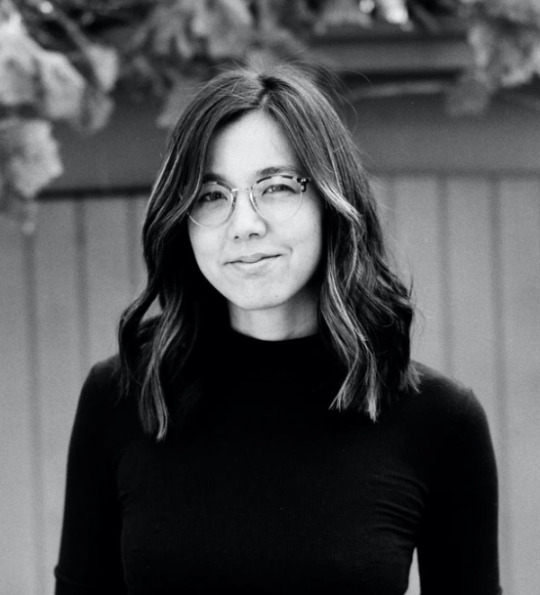
Celebrating Elizabeth Lo!
"Elizabeth Lo is an award-winning nonfiction filmmaker who is interested in finding new, aesthetic ways of exploring the boundaries between species, class, and unequal states of personhood."
Learn more on Elizabeth Lo's website.

Stray (2020)
"I think that, on some level, the film is indeed trying to channel this immigrant experience, the feeling of being an outsider. I showed the film in China once, and someone asked me why I like to occupy this outsider’s perspective. They very astutely pointed out that because I grew up in Hong Kong, culturally American with a Chinese-American mother, and later moved to America, I’m familiar with this experience of being an outsider. And yes, that’s probably why I’m drawn to the outsider’s gaze. Being a foreigner in Turkey was a very comfortable position for me."
Read more in Guernica Magazine's Elizabeth Lo: “Like the dogs, I existed in a limbo where I wasn’t entirely part of human society.”
vimeo
Bisonhead (2016)
“A quietly devastating glimpse into the modern indigenous struggle, focused just as intently on the snowy land and sturdy bison, as it is on the faces of the native tribe. Rendered with a non-showy compassion, director Elizabeth Lo pairs poetic visuals of Yellowstone with a haunting wind-swept soundscape to gracefully document the gutted native culture attempting to persevere.” (No Budge)
vimeo
Hotel 22 (2014)
"The metallic bus railings and seats generate a neon, blue-ish hue and give the film a sci-fi feel. But this is not a work of fiction, instead it’s the grim reality that many Bay Area homeless persons face each night."
Read more in The Independent Magazine.
Explore Lo's filmography on MUBI:
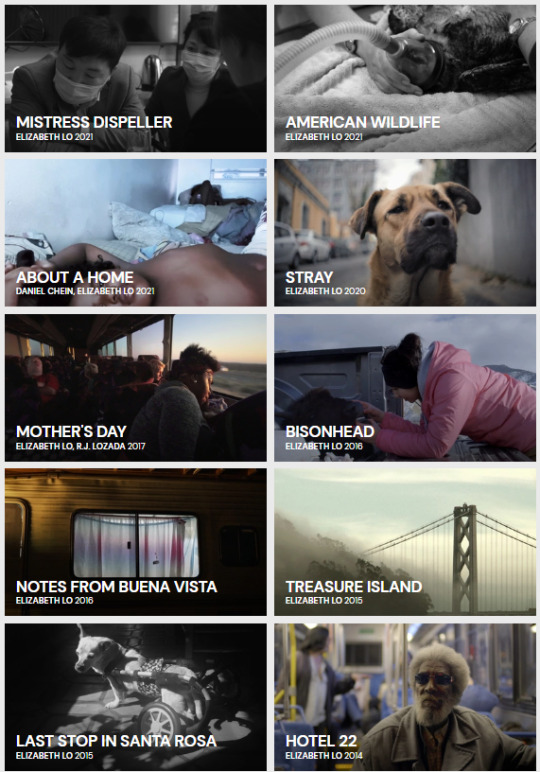
32 notes
·
View notes
Text
happy day eight of 🌷national poetry month!🌷 seeing a poem through the stages of its revision can tell you a lot about how and why the poet made the decisions that they did. luckily for us, guernica magazine has an interview series where they do just that! as part of the back draft, poets give the first and final draft of a poem and talk about how it changed.
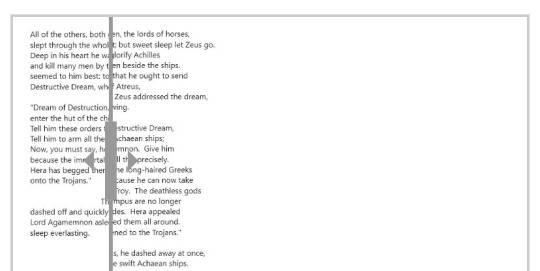
each poem has a little slider you can move with your finger to see the two versions of the poem. here are some of my favorites:
emily wilson on translating the odyssey
danez smith on titles (and this poem Kills Me)
ada limón (US poet laureate!) on a poem’s core
#please click through! even if you don’t read the interviews it’s fun to see the two versions of the poems#national poetry month#mine
16 notes
·
View notes
Text
Deadline: July 1st, 2024
Payment: Contributor's Copy
Theme: Speculative poems and micro-prose (300 words max.) engaging with themes of environmentalism, climate change, technology, and more through a lens of Midwestern experience.
Middle West Press LLC, an independent micro-publisher based in Central Iowa, has issued a call for human-generated poems and micro-prose (300 words max.) engaging with themes of environmentalism, climate change, technology, and more through a lens of Midwestern experience.
The working title of this project is Midwest Futures: Poems from Tomorrow's Heartland.
Deadline for submissions is Jul. 1, 2024. Publication is projected for Spring/Summer 2025.
Submit via Submittable here at this link.
This is explicitly a speculative poetry (and related micro-flash-prose) market. We are interested not only in the gritty and grounded, but also near-future science-fiction-infused visions of the possible. For inspirations and vibes, see also movements such “Solarpunk,” “Eco-modernism” and “Climate Fiction” (“Cli-Fi”), as well as these potential exemplars of eco-poetry and other writing:
Field Guide to Invasive Species of Minnesota: Poems by Amelia Gorman
“Botanical Fanaticism” and “Interpretation of a Poem by Frost” by Thylias Moss
“8 Black Eco-Poets Who Inspire Us” - Sierra magazine
“Five Indigenous Poets Explore Loss and Love of their Native Lands” - Natural Resource Defense Council
Forever War by Kate Gaskin
“Imagining the Future of Phoenix” - Arizona State University climate-writing exercise
Special “Cli-Fi” issue of Guernica magazine
Flyway: Journal of Writing and the Environment
While we envision the Middle West as a renewing, evolving, and complicated place, but we are also not blind to the social and environmental challenges we face.
We want to illuminate real-world problems specific to the region, including but not limited to climate change, racism, water quality, aging populations, rural/urban divide, and healthcare deserts. We want to imaginatively celebrate new possibilities, solutions, and futures.
As with previous Middle West Projects, we hope to publish work that intersects in some way with the people, places, nature, and history of the terrains and cultures we inhabit, especially works stemming from the lived experiences of women, youth, poets of color, poets who identify as LGBTQ+, military veterans, and other marginalized voices.
Our informal rule-of-thumb is that the modern U.S. states carved from the Louisiana Purchase, and/or states located west of the Ohio River and east of the Missouri River, safely define our intellectual playground. The Middle West is a moveable feast, however. We recognize that the “Middle West” includes themes, characters, and geographies that cannot be contained by mere borders. In fact, the Middle West may be most apparent in places where it is not—or when viewed and experienced by geographic “outsiders.”
Editors of the project write:
Our intent with this project is to have fun, but also to illuminate, interrogate, and challenge (via the still-human domain of poetry!!!) the ways people think about place, people, and culture. We are looking for terrain-shifting, mind's-eye-bending, firmament-rending expressions of new and future realities. Be provocative. Be poignant. Be human. Even if you write like a Giant Robot Tractor.
Ideally, many of the works submitted will engage questions such as:
How could we change the ways we build, grow, live, work, and travel on the land? What would be the results?
How could we change the ways we interact with and honor the land (and our predecessors, ancestors, and neighbors), toward visions of a "new" Midwest?
In creating and crafting their own original concepts and works, contributors might consider various modes of commenting, observing, or even inhabiting technologies, histories, mythologies, or Midwestern stories depicted in popular culture. Consider, for example:
Starship captain James T. Kirk will be born in Riverside, Iowa.
Paul Bunyan’s companion blue ox Babe is likely the result of genetic engineering.
The first binary electronic digital calculating device was constructed at Iowa State University. It was not powered by corn.
George Washington Carver both attended and later taught at Iowa State University. What futures did he imagine?
There are 15 nuclear power plants & unknown number of kaiju located in the New Madrid Seismic Zone.
Giant. Robot. Tractors.
SUBMISSION GUIDELINES:
Deadline for submissions is Jul. 1, 2024. Notifications will be sent not later than Nov. 4, 2024. Target publication date for this project is Spring/Summer 2025.
Submit from 1 to 3 poems in the same file (.DOC or .DOCX).
Work generated using ChatGPT and similar computer-assisted word "AI" will NOT be accepted. Human-generated poems only, please.
New and original work is preferred. Please note in cover letter whether specific works have previously been published elsewhere.
Simultaneous submissions are accepted. Please notify the editors via Submittable if one of more poems becomes unavailable during the consideration period.
Publisher requests non-exclusive, worldwide, English-language print and e-book anthology rights.
Contributors will receive one complimentary print or digital (where postal delivery is not available) contributor's copy.
Via: Middle West Press.
2 notes
·
View notes
Text

Ocean Vuong for Guernica Magazine: I Remember Anyway
2 notes
·
View notes
Text
Wilson: In my opinion, close third person is better at depicting consciousness. Because whenever you say “I,” that’s the PR department. That’s the left brain interpreter. That’s the character speaking for himself or herself, whereas the psychic power of close third person lets you describe what they’re really thinking. It’s not the same as trying to sell the reader on something — though that doesn’t necessarily mean it’s sincere.
Guernica: “Every confession is also a performance.” That’s from your interview with Powell’s Books.
Wilson: That’s a great quote. I really said that?
Guernica: You did; I underlined it.
— Antoine Wilson, interviewed in Guernica Magazine 24 Oct. 22
23 notes
·
View notes